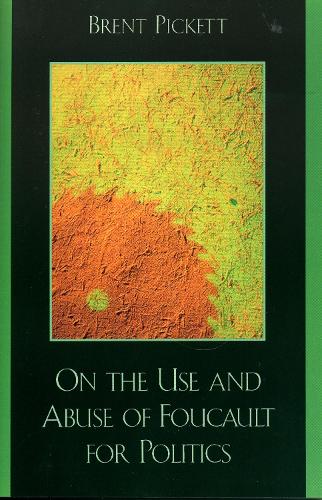
On the Use and Abuse of Foucault for Politics
(Paperback)
Publishing Details
On the Use and Abuse of Foucault for Politics
By (Author) Brent Pickett
Bloomsbury Publishing PLC
Lexington Books
20th October 2005
United States
Classifications
Professional and Scholarly
Non Fiction
Ethics and moral philosophy
Philosophical traditions and schools of thought
Western philosophy from c 1800
Phenomenology and Existentialism
Western philosophy: Enlightenment
Structuralism and Post-structuralism
Social and political philosophy
320.01
Physical Properties
Paperback
144
Width 193mm, Height 226mm, Spine 12mm
218g
Description
Sensitive to the discontinuities in Foucault's thought, neither critical nor slavishly devotional, On the Use and Abuse of Foucault for Politics demonstrates how Foucault is relevant for contemporary democratic theory. Beginning with a discussion of the interrelated ideas of power and resistance, Brent Pickett provides an interpretation of Foucault's political philosophy, including a comprehensive overview of the reasons for various conflicting interpretations, and then explores how well the different "Foucaults" can be used in progressive politics. Accessible and insightful, On the Use and Abuse of Foucault for Politics is valuable for specialists in Foucault and for students of postmodern and democratic theory alike.
Reviews
Pickett clearly maps the contemporary debate on Foucault at the same time as offering an innovative contribution to that debate. The book will be of interest to readers who are being introduced to Foucault for the first times as well as scholars in the field looking for provocative new insights into Foucault and his work. -- Simone Chambers, University of Toronto
Recommended. * Choice Reviews *
Thought provoking. * Political Studies Review *
In this highly readable and well informed essay Brent Pickett demonstrates that Foucault's work, however empirically or historically insightful, cannot sustain a coherent theoretical perspective on political reality or action by itself. There is a disjunction between Foucault's analysis of power and institutions and the normative orientations that so clearly animate his work. Contemporary political theorists attempting to appropriate and build upon Foucault's insights have almost invariably interpreted him as an individualistic anarchist, while Professor Pickett effectively argues that a more theoretically coherent interpretation would incorporate these insights into a radical theory of social democracy. He fully realizes, however, that there is textual support for either interpretive strategy, that one of them must be chosen, and that Foucault himself does not provide sufficient guidance for one or the other of these options. This book is clearly among the best I have read on Foucault, and from the perspective of a political theorist it is certainly the most useful. -- Edward B. Portis, Texas A&M University
Author Bio
Brent Pickett is Associate Professor of Political Science at Chadron State College.
